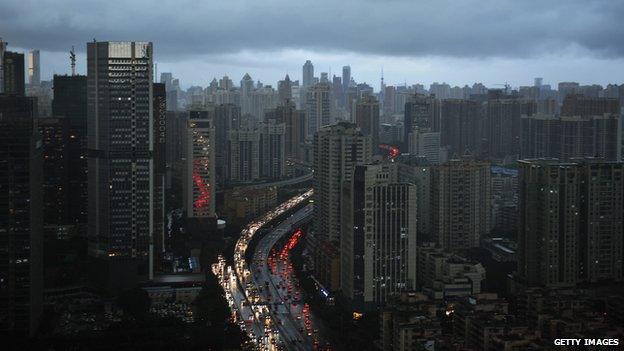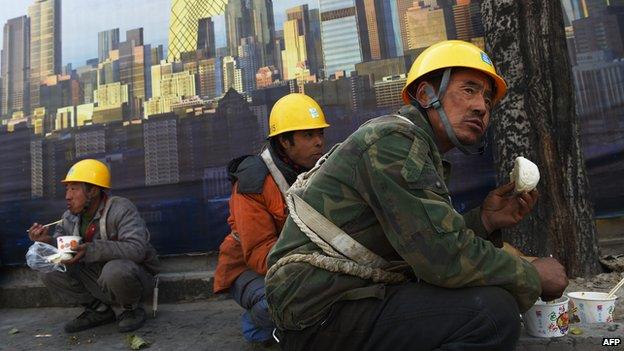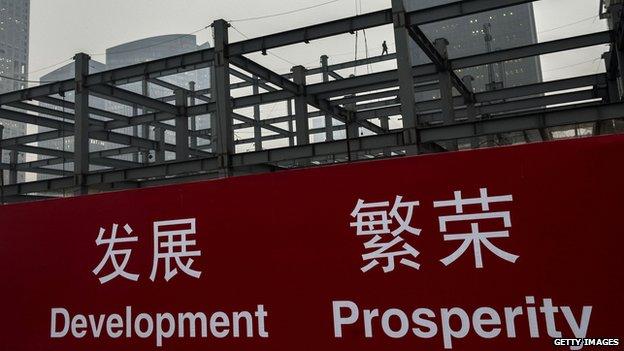China's property problems weighs on growth
- Published

Storm clouds have been gathering over China's indebted and bloated property sector
Most people won't have heard of the Chinese property developer Kaisa Group.
But as China's economy logs it slowest growth in more than two decades, the company's troubles underline the country's wider problems.
Kaisa Group, external, based in the sprawling industrial city of Shenzhen, missed a debt payment of $23m (£15m) earlier this month, unnerving the local stock and bond markets.
And investors across the globe, not just in China, are paying close attention to the company's fate.
Despite what appeared to be a healthy balance sheet, the firm ran into problems after the local government blocked sales of its property units without any explanation.
The company's chairman Kwok Ying Shing and other key executives have since stepped down, and several creditors are now asking a court to freeze its assets.
Its Hong Kong-listed shares were suspended in December after losing about half of their market value and ratings agencies have downgraded the firm's credit outlook citing a likely default on its debt obligations.
There are concerns it may become the first major Chinese real estate firm to go bust, an outcome which would signal growing financial stress not just in the property sector but the wider economy.
China's real estate sector accounts to about a third of the country's gross domestic product (GDP), meaning that any downturn in the housing market will lead to a drop in growth.
Property weakness
China announced on Tuesday that its economy expanded by 7.4% last year, missing the government's annual growth target for the first time since 1990.
The world's second-largest economy has faced numerous challenges in recent years, including slowing foreign investment and lacklustre exports because of the weak global economy.
As a result, Beijing has undertaken a raft of reforms aimed at reducing its economic dependence on manufacturing and more towards services and domestic demand.
But to many experts, it is the property market that remains the main risk to China's economy.

China's construction industry is the source of millions of jobs
In the wake of the 2008 global financial crisis, China's government spent billions of dollars on infrastructure projects to stimulate growth.
Much of the construction was funded through loans or credit to cash-strapped local governments, which now face huge levels of debts that could potentially turn sour.
China's property market has also become over-built, most visibly seen by so-called ghost towns where office and residential buildings still stand empty.
Yet prices kept rising in most of China's major cities such as Beijing and Shanghai, raising concerns that the market was becoming too frothy and treading into bubble territory.
To counter this, the government undertook a series cooling measures that, while effective, have ultimately been a drag on the economy.
In December, data showed new home prices fell for a fourth straight month, with 65 of the 70 major Chinese cities tracked by the government showing weakness.
The Fitch credit ratings agency said it does not expect a "meaningful recovery" for China's homebuilders in 2015 following a "trough" last year.
"Sector consolidation and restructuring will continue in the next 12 months, which will force out the smaller and weaker developers," it said in a report., external
"Most developers will concentrate on fast asset turnover, instead of preserving margins, to maintain business scale and sufficient liquidity to sustain their credit profiles."
Growth rates

Property is a popular financial investment among mainland Chinese
China's nearly three decades of rapid, double-digit growth has lifted millions of people out of poverty and created a large middle class.
But as China's government looks to generate more high-quality and sustainable growth, that heyday may be over.
Some analysts believe that China faces a critical balancing act, where Beijing needs to undertake key reforms yet maintain a minimum growth rate to maintain stability.
In 2013, Premier Li Keqiang said in a speech that the country needs at least 7.2% growth in order to ensure there enough new jobs are created, and to keep unemployment in the cities low.
For many Western countries, having a growth rate of 7% would be an incredibly attractive proposition. But with a quarter of the world's population, that number may be too low for China.
And even if China ends up meeting its economic targets, global investors will continue to have to watch the country's property firms and banks for any sign of trouble.
- Published20 January 2014
- Published16 December 2014

- Published29 July 2019